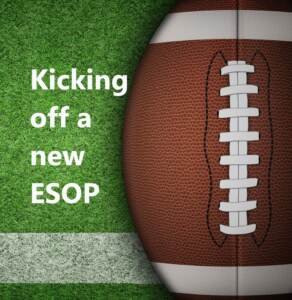Fit with salt-and-pepper hair, CEO Joe Motz stood on the podium in front of The Motz Corporation’s employees the day before the company’s Annual Service Day. The event celebrated the sports field design and construction company’s commitment to giving back to the community. In fact, business operations were closed for the day so all 100 employees could invest a volunteer day helping local organizations.
Given his long tenure since founding The Motz Corporation in 1977, and the company’s history of open communications, it shouldn’t have been a surprise to anyone when Motz started by sharing his ownership-succession plans. He announced the new owners were there, and walked off the stage to escort them into the meeting.
Much to everyone’s surprise, Motz strolled back into the meeting alone.
“The new ownership team is already here,” Motz informed the crowd with a smile, “because there’s no one in the world I’d rather share ownership with than the individuals who make this company what it is. You heard that right: we are all the new owners of The Motz Corporation.”
After a few seconds, the meeting erupted with excitement! The information session — including Motz’s clever exit and re-entry — had been a disguise for an ESOP rollout event. Employees soon discovered the rollout team’s careful planning: even the Service Day t-shirts reflected the milestone. For the first time the words “EMPLOYEE OWNED” were printed on them. The buzz of new employee-owner excitement continued through the celebration reception that closed out the day’s announcement.
Motz, like many successful business founders, wanted everyone to benefit more directly from their daily efforts growing the company. “People receive wages and benefits for helping us succeed in the short run,” he commented. “The ESOP provides everyone with an equity stake, rewarding them for their efforts to grow our business in the long run.”
Not only that, Motz and the company’s executive team believed employee ownership would impact the bottom line, customer satisfaction and future hiring. So in the year leading up to the surprise ESOP rollout event, the executive team operated in secrecy, carefully exploring different employee-ownership options. They decided to start with 20% ownership, working up to 100% over 10 years.
“In our case, Joe Motz was seeking to drive employee engagement and not specifically looking for an exit,” says Kevin McDonnell, Chief Financial Officer. “With that, a phased approach starting with 20% was clearly the right decision when thinking about it from the employees’ perspective, the founder’s perspective and the company’s perspective.”
About six months before the rollout, The Motz Corporation brought Workplace Development into the planning process to help with the crucial details.
“Workplace Development kept us pointed in the right direction and constantly introduced things we hadn’t considered … or better ways of saying something that we were considering,” says McDonnell. “The communications and messaging surrounding an ESOP rollout are absolutely critical and they helped us nail the messaging.”
Working behind the scenes, Workplace Development provided templated materials that The Motz Corporation could customize on their own. These included common FAQs for management, “what’s in it for me” PowerPoint presentation, ESOP plan features and benefits handout, and more.
“They were instrumental in crafting the rollout goals and the general approach,” says McDonnell. “They draw on many, many years of expertise and it’s obvious.”
The Motz Corporation had already been preparing years before the rollout by fostering a strong employee culture to support it. This culture is rooted in the core values of Championship Quality – Integrity – Think Like an Owner – Innovation – Self-Enrichment.
“Ownership Thinking has been a core value of The Motz Corporation for many years, as we aim to always put ourselves in the owner’s or customer’s shoes,” says Chelsea Gilman, Human Resources Generalist and ESOP Communications leader. “We were able to leverage this concept, explaining how much more important it is now that we are quite literally, owners.”
While the ESOP itself is described as being in “the infancy stages,” employees have adapted well to their new role as real owners. Gilman says this transition was made easier because in 2017 the company embraced open-book management through the Great Game of Business. It’s a way to teach and engage employees at every level to understand how business works, and how their individual roles within the team support company performance.
“Since adopting the Great Game of Business in 2017, employees have a heightened interest in and understanding of the financial side,” says Gilman. “This awareness and interest was amplified once ownership was shared with the greater group in 2018.”
Unlike some other ESOPs, The Motz Corporation didn’t have an ESOP Communications Committee in place when planning the switch. Instead, several team members were chosen to help with the rollout, while maintaining total secrecy.
“Because no one knew about the transition yet, we could not seek out those interested in being a member of the ESOP Communications Committee,” says Gilman. “We wanted the interest to be organic, versus nominating members.”
In the months after the rollout, that interest grew as the executive team conveyed the need for such a committee. By October, a solid team of six employee-owners from a cross-section of the company was assembled.
While the initial rollout is complete, the EO Comm Comm (as the company refers to the committee) will be busy in the future as they share information and progress on the ESOP expansion with employee-owners.
“The transition is ultimately still underway,” says McDonnell. “While The Motz Corporation is currently 20% employee-owned, we have plans to be 100% by 2028 and will constantly be trying to foster more and more of an ownership culture.”
Is your company considering transitioning to an ESOP? Workplace Development can work with you behind the scenes to help plan it. Or, if you prefer a full-service approach — where we create and customize all your materials and do onsite presentations — we can do that, too. Contact Jim Bado at 419-427-2435 or jbado@workplacedevelopment.com



